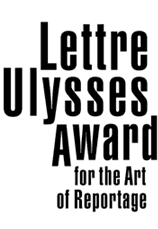
Tomás Eloy Martínez, Argentina

“Of all the professions, journalism is the one that allows the least amount of space for absolute truths. The fundamental principles of journalism are doubt, careful revision of information and constant scrutiny. It is precisely the points of certainty in a document that should arouse journalistic inquiry. To query, to learn, and to doubt a hundred times over before reporting about something: these are the most important verbs in the most risky, passionate profession of the world.”
Writer, journalist, screenplay writer, university professor. Tomás Eloy Martínez was born in 1934 in the Argentinean town of Tucumán, where he studied Spanish and Latin American Literature. In 1970, he received his MA in Literature from the Université de Paris VII, writing his dissertation on the works of Jorge Luis Borges.
After studying in Tucumán, Martínez moved to Buenos Aires in 1957, where he began working as a film critic for the daily La Nación and as Editor-in-Chief of the weekly Primera Plana. He wrote for a variety of other publications (La Opinión, Panorama, Abril) until he was forced into exile in 1975 by the newly-established military dictatorship. From 1975 to 1983, Martínez lived as an émigré in Caracas, Venezuela, where he edited the literary section of the newspaper El Nacional. Later, he launched the daily El Diario, and worked as its Editor-in-Chief (1979).
In 1969, Martínez published his first book, Sagrado. He then went on to publish La pasión según Trelew (1974), in which the author combined various literary genres including prose, drama, lyricism and journalism. Two collections of essays followed, entitled Los testigos de afuera (1978), and Retrato del artista enmascarado (1982); and a volume of short stories, Lugar común, la muerte (1979).
From 1984 to 1987, Martínez was Professor of Latin American Literature at the University of Maryland. In this period, he published his next novel, La novela de Perón (1985), dealing with Juán Domingo Perón’s return in 1973, after 18 years in exile. The book caused a scandal in Argentina, as parts of Peron’s supposedly fictional memories were suspected to be genuine. This is in fact possible, as Martínez had interviewed the Argentinean populist many times.
This book was followed by the publication of La mano del amo (1991) and Santa Evita (1995). The latter has been translated into over 30 languages, and is the most-translated book in Argentinean history. The work prompted Gabriel García Márquez to comment, “Finally, here is the novel that I have always wanted to read.”
His book El vuelo de la reina, published in 2002, won the distinguished Spanish Alfaguara Award for Best Novel. The jury attributed its decision to the importance of how Martínez describes the power of politics and mass media as a “world of corruption” that pervades all aspects of society. The book was subsequently translated into 17 languages. He has also written ten screenplays. His most recent publication, a novel entitled El cantor de tango, has already been released in Argentina and Spain, and will be published by Bloomsbury (London & New York) and Suhrkamp (Germany) at the beginning of 2005.
Martínez has received seven honorary doctorates. He has been a fellow of the Guggenheim Foundation, the Wilson Center, and the Kellog Institute, all based in the United States; and is currently Deputy Director of the Fundación para un Nuevo Periodismo Iberoamericano in Cartagena de las Indias, Colombia. Martínez has written frequently for La Nación of Buenos Aires, El País of Madrid, and the New York Times Syndicate since 1995.
Tomás Eloy Martínez resides in New Jersey, where he is Distinguished Professor for the Latin American Studies Program at Rutgers University.
